On December 5th 2016, I attended a workshop titled Exploring Power and Privilege, facilitated by Mojdeh Cox of the Canadian Labour Congress in partnership with Pillar Nonprofit Network and Family Service Thames Valley. It was intended to be a follow-up to the Community Forum on Racism held on September 7th 2016. The target audience and primary attendees of the workshop were executive directors, board members, and senior managers in the nonprofit sector.
This write-up will serve as a summary of the workshop. Some of my own thoughts will be shared, though these reflections are part of an ongoing process of exploring power and privilege. Although I do not hold a formal leadership role in the nonprofit sector, I was given the go-ahead to attend this workshop as I am currently interning at Pillar and I am interested in being a part of this conversation. My recent undergraduate background in the social sciences and humanities has given me some understanding of key concepts relating to privilege and power but there is much more learning and listening to do. I am also very new to my role at Pillar and my knowledge of the various policies and processes of nonprofits is limited.
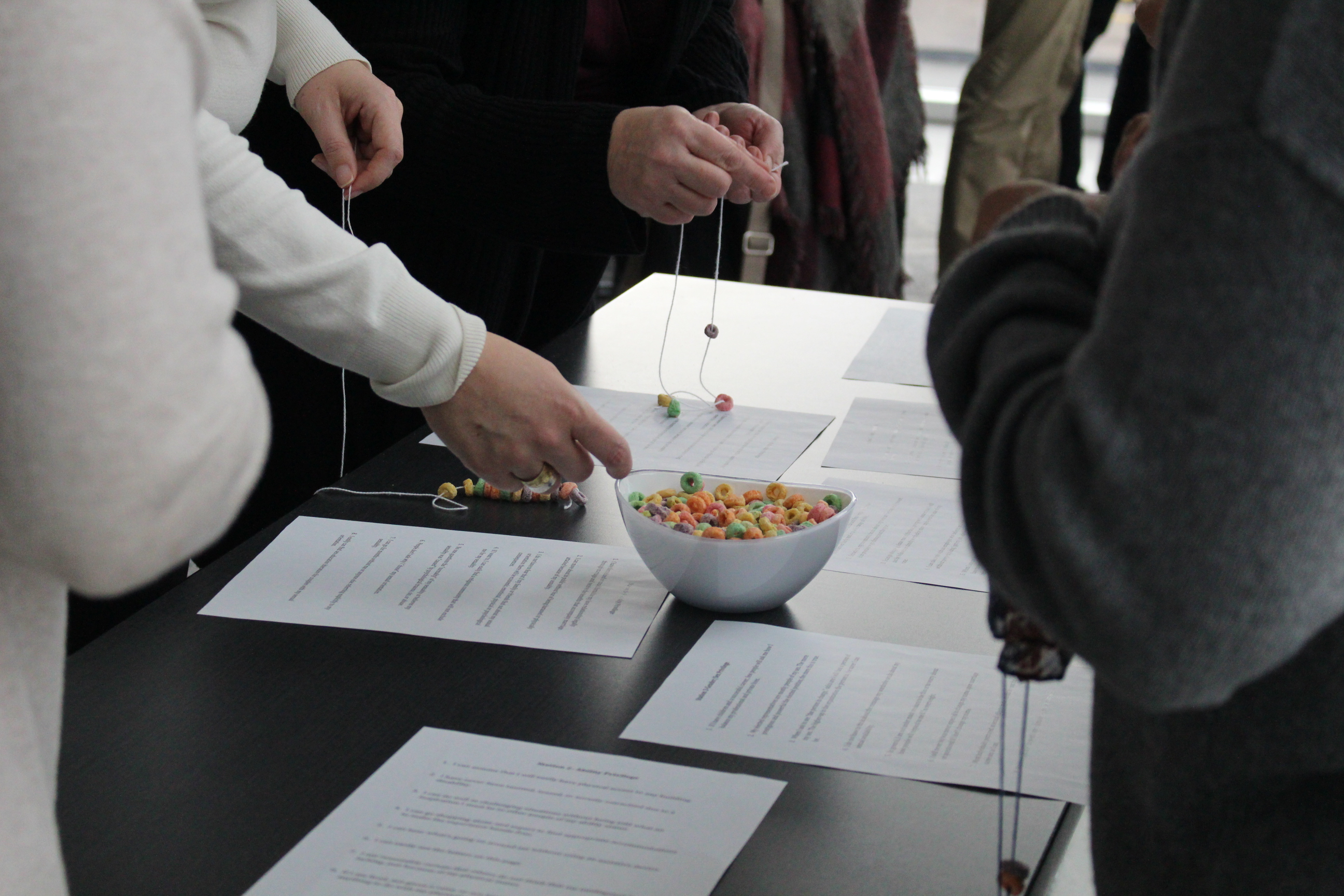
Thank you to the people who have discussed their reflections on the workshop with me. If anyone has any thoughts or questions about what I write here – please get in touch: admin5@pillarnonprofit.ca.
The workshop started out with general introductions of facilitators and participants. The group was a fairly reflective sampling of the nonprofit sector, which is predominantly female 1 and lacking in diversity 2, especially in senior leadership positions.
The workshop was the first of four, serving as a primer to establish a common acknowledgement, understanding, and language surrounding power and privilege. With the goal to create deeper transformative social change, subsequent workshops will involve further discussions and information about how to create and implement this significant change.
Facilitator Mojdeh Cox introduced key concepts related to privilege, including intersectionality, anti-oppression and allyship. Given time constraints, these introductions were brief but comprehensive.
Intersectionality
Intersectional theory, developed by Black legal scholar Kimberlé Crenshaw, is often oversimplified, however, Mojdeh provided a good overview and underscored that there is room for more “intersections” between various identities and forms of discrimination. This framework is essential to understanding how social inequality and systemic injustice occurs on a multidimensional and intersectional basis.
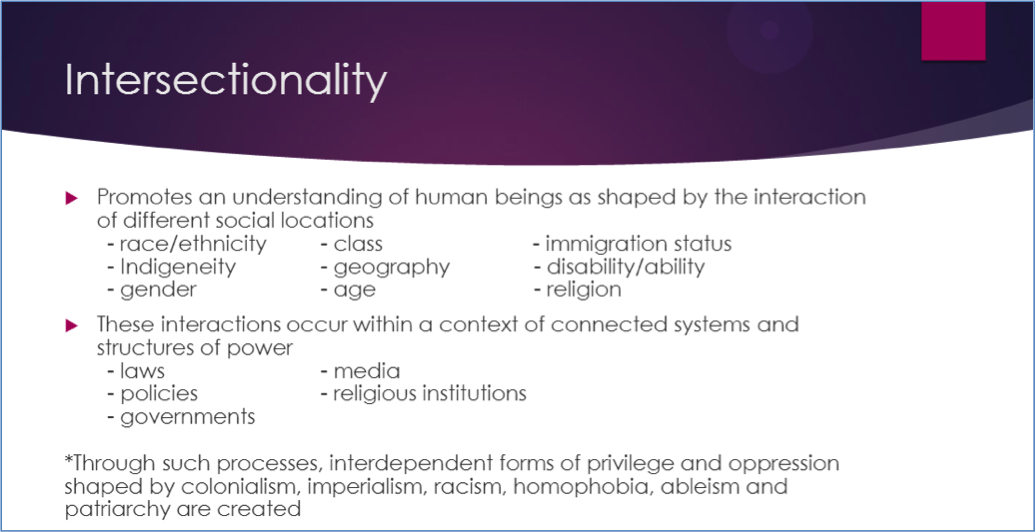
Privilege
How privileged are you?
Rather than simply defining privilege or giving us some examples of privilege in operation, Mojdeh had us complete an interactive activity to acknowledge and explore personal power and privilege. It involved stringing fruit loops (in place of beads) onto a piece of yarn every time we answered “yes” to having a particular privilege. These privileges were laid out in lists and categorized around various identities (e.g. gender, race, class). After completing the exercise, we were told to tie off our string and wear it as a necklace.
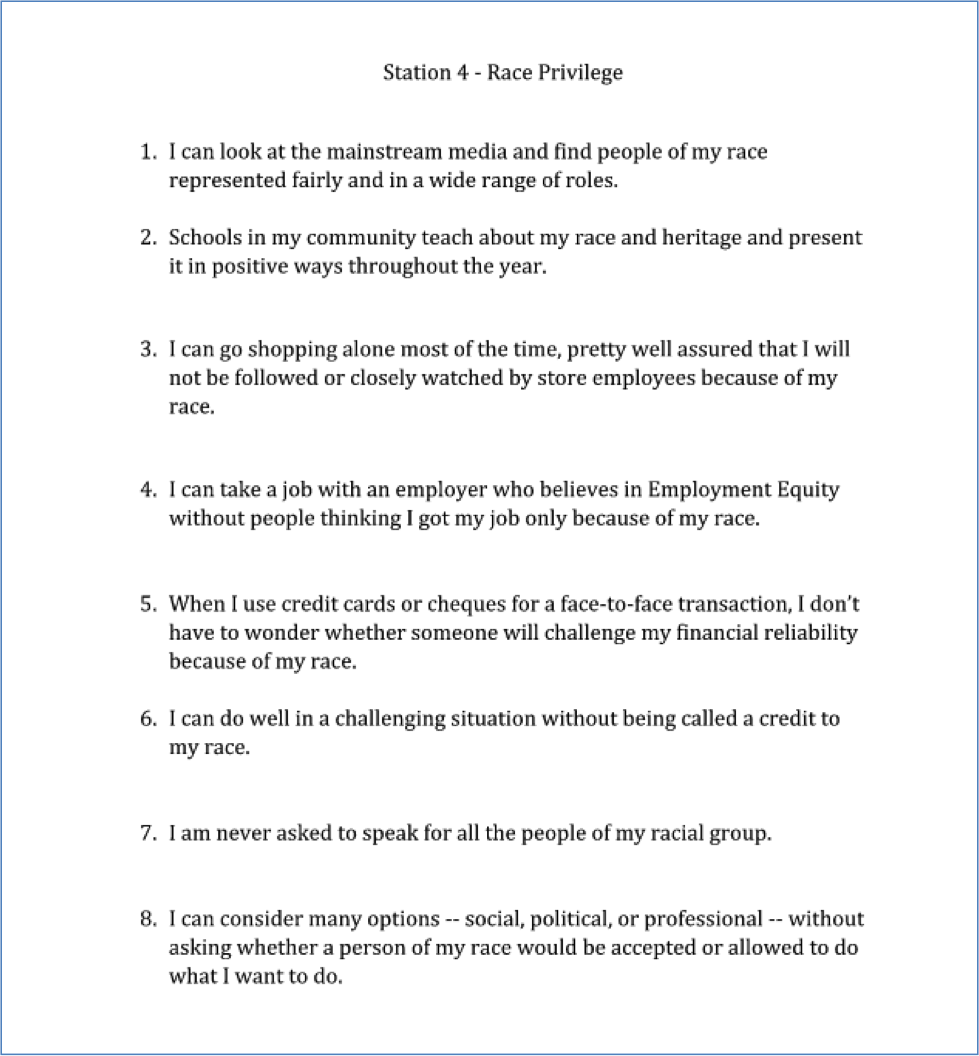
One of the seven privilege lists.
Although it may have been useful for this exercise to classify the privileges by identity, it is important to emphasize that these identities (e.g. race and gender) are not completely independent of one another. The privilege or oppression you experience is the result of the intersection of numerous identities and related systems of discrimination and oppression.
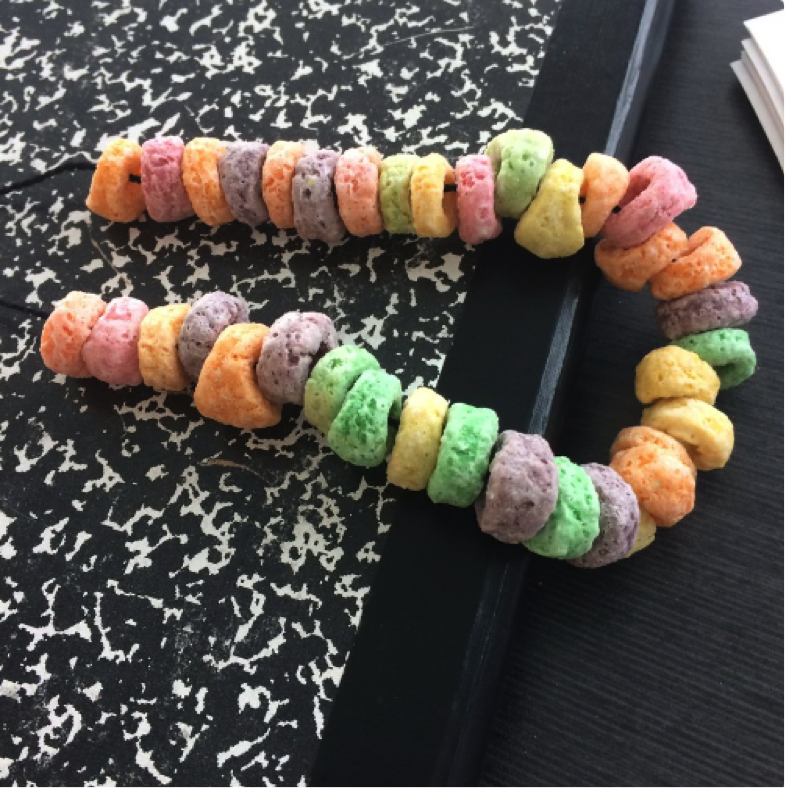 This activity made visible the privilege in the room. For some, it seemed like the first time they had engaged in unpacking their personal privilege. This is a crucial step to using this power and privilege to lead individually and collectively for social justice. Although essential, considering one’s own privilege can be challenging – we must move beyond feelings of denial, guilt, or shame to actions of solidarity and responsibility. Photo: courtesy of @RuthAnnShantz
This activity made visible the privilege in the room. For some, it seemed like the first time they had engaged in unpacking their personal privilege. This is a crucial step to using this power and privilege to lead individually and collectively for social justice. Although essential, considering one’s own privilege can be challenging – we must move beyond feelings of denial, guilt, or shame to actions of solidarity and responsibility. Photo: courtesy of @RuthAnnShantz
Sitting in this understanding of power and privilege is essential. Although this was not a new consideration for all participants, the activity and following discussion encouraged us to recognize and be critical of privilege and power on a systemic and personal level. It allowed the group as a whole to establish some common acknowledgement and understanding of privilege.
There was a lot of thoughtful reflection following the activity. One of the points that stood out to me was that an attendee challenged the examples of ‘privilege’ listed in the exercise, underscoring how privilege actually shapes our understanding of what constitutes a privilege.
Allyship and Leadership
 Allyship was also introduced and briefly discussed. Mojdeh shared a video from Franchesca Ramsey titled “5 Tips For Being An Ally” (the first tip: understand your privilege). Outlining general guidelines for those wishing to fight for the equality of a marginalized group which they are not personally a part of, the video is a very good introduction to the concept of allyship.
Allyship was also introduced and briefly discussed. Mojdeh shared a video from Franchesca Ramsey titled “5 Tips For Being An Ally” (the first tip: understand your privilege). Outlining general guidelines for those wishing to fight for the equality of a marginalized group which they are not personally a part of, the video is a very good introduction to the concept of allyship.
One of the questions posed by Mojdeh was “What are the personal challenges & barriers to being a good ally that you face as a leader?”
Evidenced from the discussions that followed, attendees want to be allies but they are unsure of how to actually be an effective ally in real-world concrete situations. In other words, how do we operationalize allyship? Given the target audience of the workshop, it will be useful to explore how formal leaders in the nonprofit sector can leverage the privilege and power that comes with these roles to facilitate social equity. Although the workshop is directed at this specific group, leaders do not only exist on top of management chain but at all levels.
Mojdeh also asked us to identify and discuss gaps within our work or volunteer environments with respect to integrating an intersectional lens. Identifying shortcomings can help us challenge the structures, policies, and systems that limit the full participation of all people. As one attendee noted, the hierarchal structure of governance in the nonprofit and other sectors may be antithetical to anti-oppressive framework. The issue of how to create meaningful social change while working within an inequitable system is a recurrent topic worthy of further discussion in future workshops, though we also must keep in mind the importance of personal responsibility.
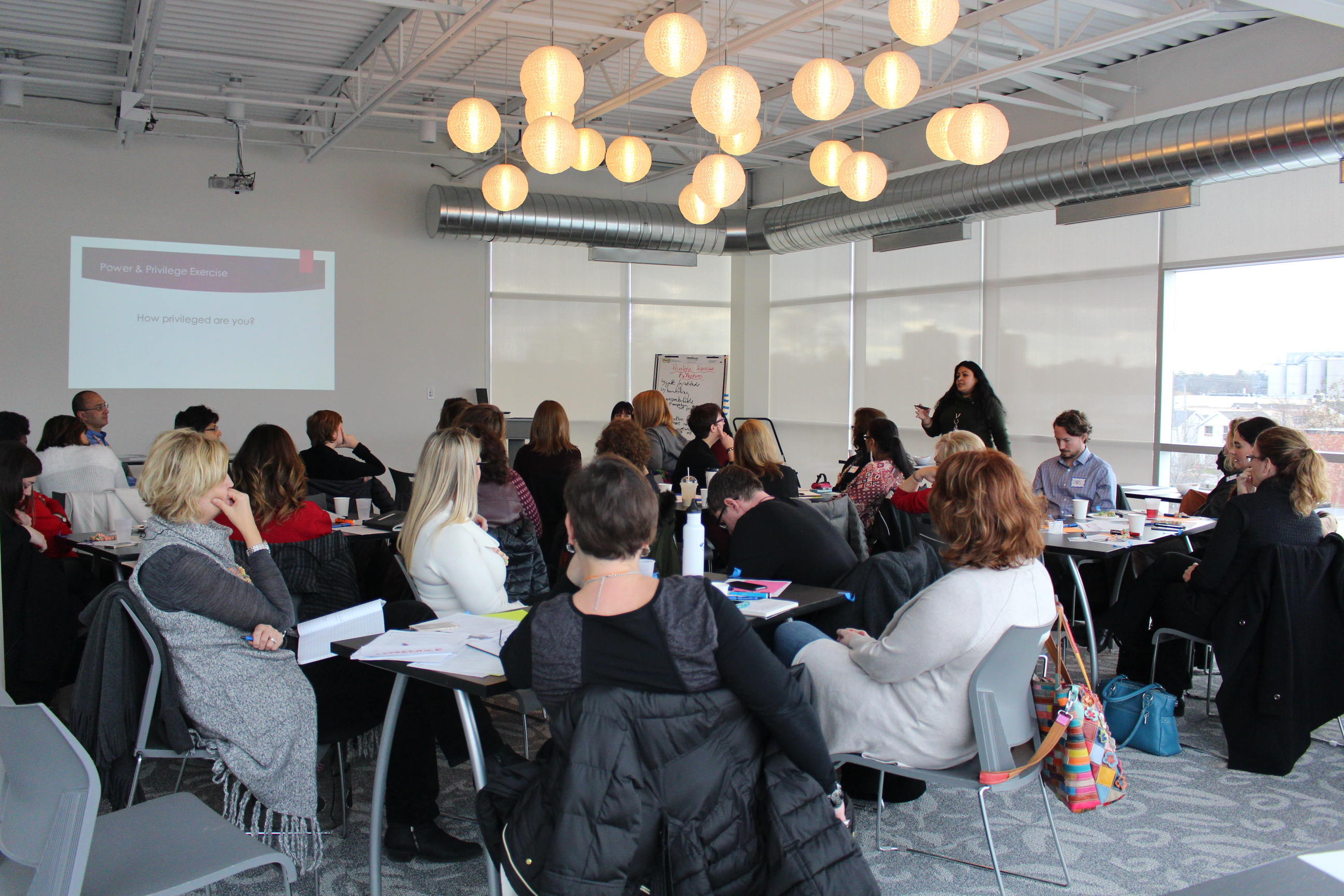
Conclusion
This workshop served as a good starting point for reflection and discussion. Mojdeh helped provide an excellent foundation for work to follow, enabling an understanding of key concepts and encouraging a critical reflection about privilege and power. I am hopeful that subsequent workshops and discussions will provide more concrete tools for leaders in the nonprofit sector to act as allies and creating meaningful positive change within the sector and community.
I would like to finish this write-up with a mention of praxis: the act of applying, engaging or embodying an idea or lesson. This was a recurrent topic in many of my philosophy classes, discussed in the writings of many philosophers including Plato, Kierkegaard, Marx, Heidegger and Hannah Arendt. Praxis is reflection and action that embodies certain qualities including a commitment to human well-being, the search for truth, and respect for others. Aligned with the goals of the workshop and seemingly the attendees themselves, discussions surrounding power, privilege, allyship, and anti-oppression should exist alongside action that is thoughtful, sustained, and significant.
These workshops and forums offer us an incredible platform to listen, share, and learn. As someone newly entering the nonprofit sector, I am very grateful to see leaders taking the time to have these types of conversations and making the commitment to help create equitable and diverse organizations and communities.
Thank you so much to Mojdeh and all participants!
Blog post written by Olivia Gordon
